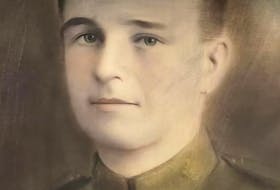
BY WENDY ELLIOTT
Kings County Advertiser/Register
Counselling representatives from 40 countries in a field of war is a challenging political and humanitarian role
Dr. Tracy Demmons recently spent 18 months on a mission with the United Nations in Afghanistan, returning last winter. As a counsellor, she belonged to a team of mental health professionals who took on the psychological, social and spiritual support of roughly 2,000 UN staff in the county. Eighty per cent were Afghan nationals.
“My friends and colleagues came from Bhutan, France, Russia, Azerbajan, Spain and Peru. It was, very literally, the United Nations.”
Living in a protected compound in Kabul, she told a recent ecumenical gathering in Wolfville she traveled frequently to 18 other regional and provincial offices. While running food, health care, education and other programs, Demmons says staff encounters stressful, dangerous and traumatic situations. They often respond with shock and panic attacks.
“I wanted to do something real, hands-on and practical,” but “the longer I remained in dusty Kabul - with its soaring mountain peaks, intricately painted transport trucks, endless vegetable carts full of melons, and police checks surrounded by roses; the more I began to sense that I was not there to give, but to receive.”
In a land ravaged by war and loss, supporting those in crisis, Demmons started feeling “like I was the one who was having my veil lifted.
“Traffic, pollution and congestion are incomprehensible: when I arrived, there was not one traffic light in Kabul, a city of five million people. There is no basic sanitation, no running water, no basic healthcare.”
Knowing about the poverty, illiteracy and low status of women was one thing; experiencing it was another. Demmons found herself marveling at the great determination Afghans display going about their lives.
“The tomatoes are sweet, the rain violent, the moon at night is bright and clear and the cries of the children break your heart. The women in burqas moved like blue ghosts through the streets and the old beggars with one leg sit on the ground, crying ‘please, please.’”
The complex, violent and yet beautiful country taught her a great deal about herself and spirituality.
“Life and death are very real in Afghanistan, and one is forced to ask and answer very tough questions - right away.”
According to Demmons, the compound was a noisy place with helicopters flying at all hours and explosions.
“The Taliban are at our doorstep, and all I can do today is listen to one man’s story of loss and death and comfort him with the succor of being heard.”
She pays tribute to one remarkable security officer from Ghana she met, Laurence Mefful, who died last November during an attack on a UN guesthouse.
“He held off the Taliban attackers for an hour by himself with a weapon, saving the lives of six staff, but then was shot in the back and killed instantly.” She says deep faith and a love for his fellow neighbour motivated Mefful.
Afghanistan “helped me to remember what I believe in and my place and calling in the world.”
Extra empathy
It may be Demmons has an extra measure of empathy: she has survived two brain tumours.
Back in 2000, she developed the first of two benign tumours, effectively treated but which left her with hearing loss. An experimental cochlear implant helps her listen to others and made a huge difference in Kabul, where her closest colleagues had thick accents.
“Praise God,” she says, quite literally, for the miracle that allowed her to hear the cries of those in pain.
Taylor’s legacy, special service
The Charles J. Taylor Center for Chaplaincy and Spiritual Care was recently established at Acadia Divinity College.
Dr. Charles (Charlie) Taylor was the founder of clinical pastoral education in Canada, and he received the Order of Canada in 2003 in recognition of work in the area of prison ministry.
The Taylor Centre will offer professional training for chaplains and spiritual care providers, as well as oversee the current courses offered in the pastoral care program, offered for people training for traditional, pastoral ministry. It is anticipated the Taylor Centre will officially be launched at the Simpson Lectures in February 2011, and will oversee expanded degree and program offerings in the areas of chaplaincy and spiritual care.
Dr. Tracy Demmons has been appointed director of the Taylor Centre and, together with team of qualified professionals, she will teach in areas related to chaplaincy, spiritual care and pastoral care. Clinical pastoral education will also be a core component of the program.
A growing number of men and women feel called to chaplaincy and spiritual care in specialized ministry settings, Demmons says: in hospitals and continuing-care facilities, prisons and with the military. These environments require a specialized skill and knowledge set, and the centre will be a ministry program more tailored to a sense of calling toward a specific vocation.
Previous to her appointment, Demmons was a staff counsellor, working with U.N. personnel in Afghanistan for 18 months. Prior to that, she completed her Ph.D. in theology at the University of St. Andrews in Scotland, delving into the spiritual care of persons with intellectual disabilities. Her thesis work grew out of questions encountered while undertaking her clinical pastoral education residency at the Nova Scotia Hospital in Dartmouth, working, in particular, as a chaplain for clients with disabilities. Demmons also has worked as a hospital chaplain in acute care and psychiatric settings.
In the summer of 2007, she completed a doctoral internship with the United Nations in New York with the critical incident and stress management unit. In 2008, she completed an advanced course on crisis and stress management for counsellors with the UN in Thailand. She has assisted in conducting numerous trainings for UN staff in the area of psychosocial support.
Demmons did not have the opportunity to study with Taylor or his respected successor, Dr. Dennis Venoitte, but she was aware during her student days of their pioneering work and legacy in the area of pastoral care. Demmons recalls she was at a conference in the Netherlands and, when a fellow participant heard she was from Acadia, his immediate question was, “Did you know Charlie Taylor?!”
She laughs as she tells this.
“Charlie’s reputation preceeds him!”
Demmons is looking forward to working with a team of experienced educators- including experts Chris Coffin, Elizabeth Legassie and Vicky Patton who will offer courses in their fields, such as addictions and suicide prevention.
Enquiries regarding programs and courses through the centre may be directed to Demmons, at [email protected]








